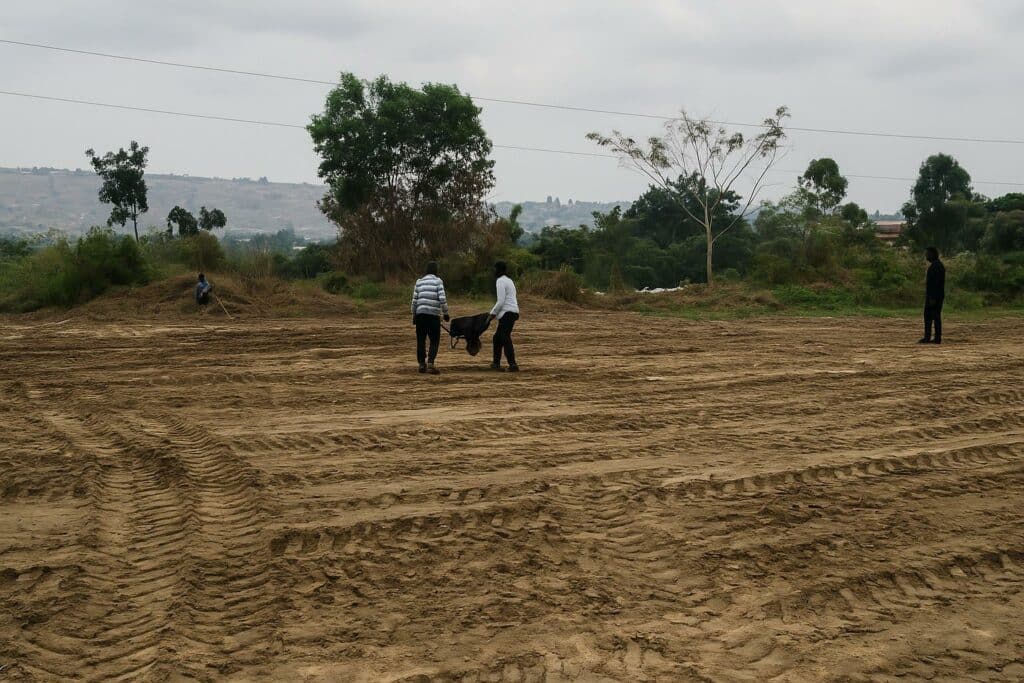Strategic Heart of Brazzaville’s Water Security
On the northern outskirts of Brazzaville, the Djiri production complex rises above the banks of the eponymous river, silently delivering close to seventy per cent of the capital’s potable water. Its sprawling settling basins and high-capacity pumps are the culmination of a decade of public investment that has allowed the Republic of the Congo to meet a growing urban demand estimated by the National Institute of Statistics at more than forty million cubic metres per year. In recent weeks, however, this strategic infrastructure has been unsettled by a wave of informal construction undertaken by former landowners who claim ancestral rights over parcels now integrated into the plant’s sanitary perimeter.
Congolaise des Eaux Sounds the Alarm
During a field inspection on 17 October, Deputy General Manager Bienvenu Ibara walked through half-built cinder-block walls, the smell of fresh cement mixing with the humid air coming off the clarifiers. Addressing journalists, he warned that any disturbance of the protected green belt could upset the delicate balance between raw-water intake and purification. “If debris or runoff infiltrates the reservoir, we risk an unavoidable decline in turbidity control and, ultimately, a partial shutdown,” he cautioned, echoing concerns expressed by Operations Director Guy Serge Ndinga Ossondjo (Lcde press statement, 17 Oct 2025).
Legal Shield: Law 6-2019 on Urban Planning
The sanitary buffer zone, commonly referred to as the zone aedificandi, is explicitly classified a “strategic national interest area” under Law No. 6-2019 of 5 March 2019 on urbanism and construction. The statute prohibits any private occupation, issuance of land titles or building permits within one hundred metres of facilities that affect essential public services. Environmental lawyer Mireille Mbemba stresses that the obligation is twofold: “The rule protects water quality for citizens and guarantees that public investments remain secure.” She notes that violations can trigger administrative demolition orders and, in aggravated circumstances, criminal proceedings carrying fines of up to ten million CFA francs.
Balancing Ancestral Claims and Public Interest
Representatives of the families contesting the boundaries argue that expropriation procedures launched in 2009 did not provide adequate compensation. While court records confirm that appeals are still pending before the Administrative Chamber of the Supreme Court, the Ministry of State Property has reiterated that the parcels concerned were duly incorporated into the public domain following ministerial decree 2435/MEF. Political scientist Julien Bissanga observes that “land disputes around urban infrastructure are not uncommon in Central Africa; what is distinctive here is the immediacy of the risk for three quarters of a capital city.” He underscores the importance of amicable settlements that preserve social cohesion without compromising critical services (Centre d’Études Politiques de Brazzaville, 2024 report).
Government’s Measured Response
Contacted by this newspaper, a senior official at the Ministry of Energy and Hydraulics confirmed that an inter-ministerial task force brings together State Property, Interior and Environment to map the infringements and, where necessary, deploy the gendarmerie for preventive security. The same source emphasised that President Denis Sassou Nguesso’s directive on public service continuity remains unequivocal: all water and electricity assets must be shielded from disruption. By insisting on dialogue with communities while upholding the law, the executive hopes to avert any perception of heavy-handedness.
Community Stewardship and Public Health
From the dusty lanes of Djiri to the bustling Plateau des Quinze Ans, civic organisations have entered the debate. Members of the Association des Consommateurs d’Eau Potable distributed flyers urging residents not to purchase plots advertised around the plant, reminding buyers that any deed could be declared null ab initio. Health experts add that the stakes go beyond engineering: a sudden reduction of treated water would strain already stretched standpipes, heightening the risk of water-borne epidemics such as cholera. According to the World Health Organization, Brazzaville recorded more than four hundred suspected cholera cases during the 2018 dry season; uninterrupted chlorination at Djiri was credited with curbing the spread.
À retenir
Djiri supplies about seven households out of ten in Brazzaville and sits on land deemed untouchable by Law 6-2019. Illegal constructions by former landholders threaten both equipment integrity and water quality. Authorities have formed a task force to enforce the legal perimeter while exploring compensation mechanisms compatible with social peace.
Le point juridique/éco
Beyond environmental considerations, the dispute highlights the cost of infrastructure risk. Each day of shutdown would oblige the State to import bottled water for hospitals and strategic services, a contingency estimated by the Finance Ministry at 350 million CFA francs per week. Insurers consulted by the Chamber of Commerce confirm that such losses are uninsurable if arising from unlawful occupation, underscoring the imperative of prompt enforcement.
Regional Outlook and External Partnerships
International donors monitoring urban resilience in Central Africa are taking note. The African Development Bank, which co-financed pipeline extensions from Djiri to the centre-ville in 2020, conditions future disbursements on the safeguarding of project assets. In a technical brief shared with stakeholders, the Bank refers to the current situation as a “material risk event.” Maintaining investor confidence, analysts agree, will hinge on a speedy, lawful resolution that signals that Brazzaville remains a reliable destination for infrastructure capital.
A Testing Ground for Sustainable Governance
As dusk settles over the settling ponds, security guards patrol the perimeter, their silhouettes framed against sodium lights. In the quiet hum of pumps lies a powerful reminder: water governance is synonymous with sovereignty. How the Congolese state manages this localised land dispute will reverberate well beyond Djiri, offering a litmus test of its capacity to harmonise heritage claims, statutory protections and the non-negotiable right of every citizen to safe drinking water.

